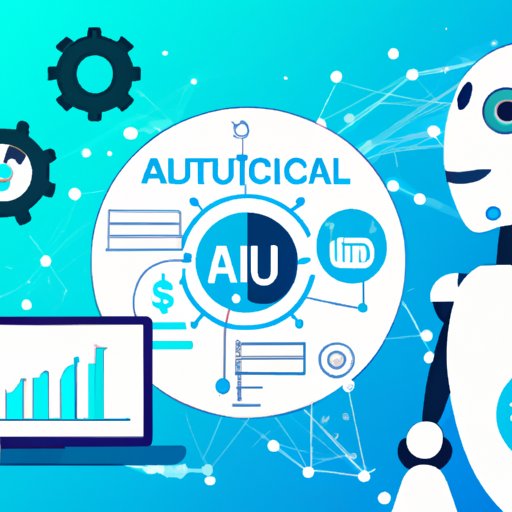Introduction
Artificial intelligence (AI) has been rapidly advancing over the past few years, and its potential applications are being explored in many different fields. One area where AI is making a significant impact is the field of accounting. As AI technology continues to improve, some people have begun to consider whether it could eventually replace accountants altogether. In this article, we will explore the potential of AI replacing accountants, including the pros and cons of using AI in accounting, how AI is changing the accounting profession, and the strategies that accountants can use to stay competitive in a changing industry.

Exploring the Pros and Cons of AI Replacing Accountants
Using AI in the accounting profession has both advantages and disadvantages. On the one hand, AI-driven automation could make accounting tasks much easier and faster than they are currently. Automating certain processes could also reduce errors and provide more accurate financial data. Additionally, AI-powered customer service tools could make it easier for clients to get answers to their questions and concerns quickly.
On the other hand, there are some drawbacks to using AI in the accounting profession. For example, AI-driven automation could lead to job losses as machines take over certain roles that were previously held by human workers. Additionally, AI systems can be expensive to implement and maintain, and they may require specialized knowledge to operate. Furthermore, AI systems can be vulnerable to hacking or other security breaches, which could put sensitive financial data at risk.

How AI Is Changing the Accounting Profession
AI is already having a major impact on the accounting profession. The most obvious change is the automation of certain accounting tasks. Automation can help streamline processes such as bookkeeping, payroll, invoice processing, and more. This can help save time and money, as well as reduce errors. AI-driven automation can also help with compliance and regulatory issues, as it can help ensure that all relevant laws and regulations are followed.
AI is also improving the accuracy of financial data. AI systems can analyze large amounts of data quickly and accurately, allowing accountants to make more informed decisions. Additionally, AI-powered customer service tools can help accountants provide better service to their clients. These tools can quickly answer common questions and provide personalized advice based on the client’s individual needs.
Interview with an Accountant on the Impact of AI
To gain a better understanding of how AI is impacting the accounting profession, we interviewed Roberta Smith, a Certified Public Accountant with 10 years of experience. When asked about her experience using AI in the workplace, she said:
“I’ve been using AI for a few years now, and I have to say that it has made my job a lot easier. It’s allowed me to automate mundane tasks and focus more on providing valuable services to my clients. It’s also helped me become more efficient, as I’m able to quickly analyze large amounts of data and make more informed decisions.”
When asked about the potential long-term effects of AI on the profession, she said:
“I think AI is going to continue to have a major impact on the profession in the years to come. We’re already seeing automation being used to do things like bookkeeping and payroll, and I’m sure this trend will continue. However, I don’t think AI will completely replace human workers anytime soon. There are still many tasks that require human judgment, and I think these roles will continue to be important in the future.”
Examining the Potential of Automation in Accounting
Automation can bring many benefits to the accounting profession. Automated processes can help streamline tasks such as bookkeeping, payroll, and invoicing, saving time and money. Automation can also help reduce errors and improve accuracy of financial data. Additionally, automation can help with compliance and regulatory issues, as it can help ensure that all relevant laws and regulations are followed.
However, there are also some challenges associated with automation in the accounting field. For example, automated processes can be difficult to set up and maintain, and they may require specialized knowledge to operate. Additionally, automated systems can be vulnerable to hacking or other security breaches, which could put sensitive financial data at risk.

The Future of Accounting: AI vs. Human Workers
As AI technology continues to advance, some people have begun to ask whether AI will eventually replace human workers in the accounting profession. To answer this question, it’s important to compare the capabilities of AI and human workers. AI systems can analyze large amounts of data quickly and accurately, but they lack the creativity and problem-solving skills of human workers. Additionally, AI systems may be vulnerable to security breaches, while human workers can be more reliable and trustworthy.
Ultimately, the type of worker that is best suited for the job will depend on the specific task. For certain tasks, AI may be the best option due to its speed and accuracy. For other tasks, human workers may be the better choice due to their creativity and problem-solving skills. The key is to find the right balance between the two types of workers.
What Skills Will Accountants Need to Survive AI Disruption?
As AI technology continues to advance, it’s important for accountants to develop the skills necessary for working with AI. This includes understanding the basics of AI technology, such as machine learning and natural language processing, as well as developing the ability to interpret and analyze data. Additionally, accountants should also have a strong understanding of the software and tools used in the accounting profession, such as QuickBooks and Excel.
In addition to developing technical skills, accountants should also focus on developing soft skills such as critical thinking, communication, and problem-solving. These skills will be essential for staying competitive in a changing industry. Additionally, accountants should also stay up-to-date on current trends in the accounting profession, as well as any new technologies or tools that could potentially be used in the field.
Conclusion
AI is already having a major impact on the accounting profession, and its influence is only expected to grow in the years to come. While AI-driven automation can make certain tasks easier and more accurate, it’s important to remember that AI systems still lack the creativity and problem-solving skills of human workers. Ultimately, the success of AI in the accounting field will depend on finding the right balance between the two types of workers. Accountants who develop the skills necessary for working with AI and stay up-to-date on current trends in the industry will be best positioned to succeed in a changing landscape.
(Note: Is this article not meeting your expectations? Do you have knowledge or insights to share? Unlock new opportunities and expand your reach by joining our authors team. Click Registration to join us and share your expertise with our readers.)
